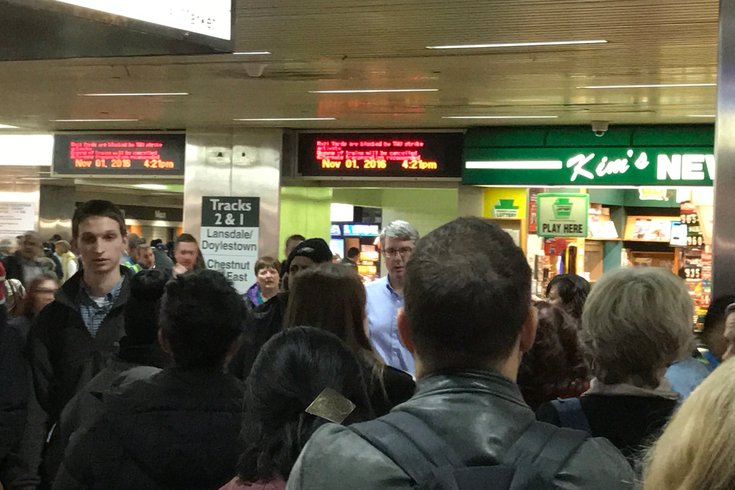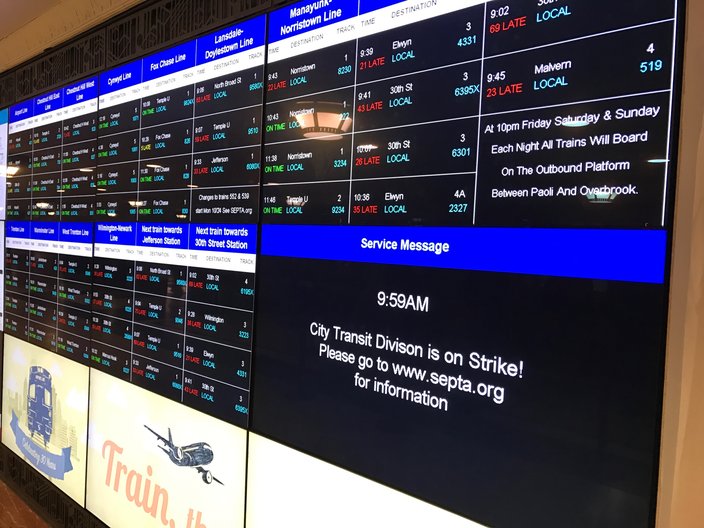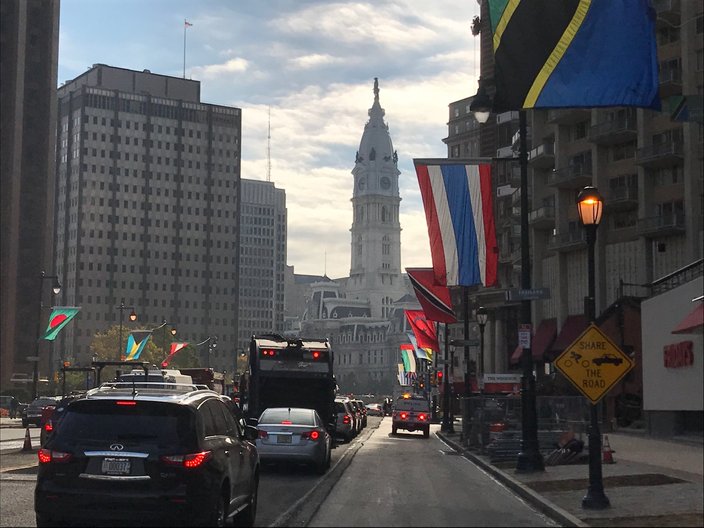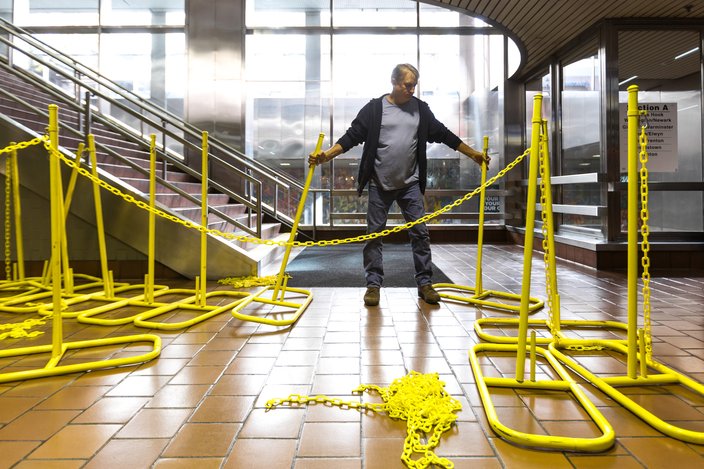
November 01, 2016
 Bob McGovern/PhillyVoice
Bob McGovern/PhillyVoice
SEPTA says it was forced to cancel a 'significant number' of Regional Rail trains due to strike-related pickets during the evening commute on Nov. 1, 2016. That left Jefferson Station jammed with commuters trying to get home.
If the morning rush into Philadelphia tested the nerves of thousands of commuters, thanks to the SEPTA strike, then the afternoon commute heightened those frustrations, perhaps exponentially.
Picketers with Transport Workers Union Local 234 forced the transit agency to cancel a "significant number" of Regional Rail trains during the evening commute, said SEPTA, which accused striking workers of blocking access to facilities by crew members tasked with operating Regional Rail trains.
Shortly before 6 p.m., SEPTA announced it had obtained an injunction preventing picketers from blocking Regional Rail employees from reporting to work. As a result, cancellations are subsiding, but SEPTA advised riders to expect significant delays during the continuation of the evening commute.
"While TWU strike-related demonstrations are permitted, the injunction bars picketers from interfering with Regional Rail service," SEPTA spokeswoman Carla Showell-Lee said in a statement. "SEPTA hopes this will ensure that incidents like those that disrupted service today will not happen again."
A full list of the canceled trains can be viewed on SEPTA's website.
News of the disruptions came as SEPTA and TWU Local 234 officials were expected to return to the bargaining table Tuesday evening.
"We're just waiting to see how that is going to happen," SEPTA spokesman Andrew Busch said earlier Tuesday afternoon. "But we're hopeful that we'll get back to the table today and hopefully move toward a resolution."
But Local 234 later released a statement saying its negotiating team had not heard anything from SEPTA.
"As of 5 p.m., the TWU 234 bargaining team has not heard one word from SEPTA's management, despite their claims to desire a quick settlement and the need for around-the-clock bargaining," the statement read.
In the meantime, commuters must continue to navigate gridlocked roadways or find alternative routes to work and school. Commuters who typically rely on SEPTA for transportation tried myriad alternatives Tuesday morning, including bicycling, ridesharing or hopping on shuttle buses.
Regional Rail, a popular alternative, was packed during peak hours, with many trains operating on significant delays. But it became a hellish option during the afternoon commute.
Lines at Jefferson Station numbered into the hundreds as a SEPTA board announced "dozens" of Regional Rail cancellations. Riders described the scene as chaotic. On the trains, passengers filled the seats and jammed elbow-to-elbow in ailses.
"I'm not phased, but try talking to me in three days," said Amy Seltzer, 36, of Mayfair.
Other riders were not nearly as patient.
"This kind of stuff, it's just irresponsible," said Bill, a 60-year-old man from Northeast Philly who declined to give his last name. "Look at the lines."
SEPTA had anticipated increased ridership on the Regional Rail trains. To avoid overcrowded platforms, riders who board at Temple, Jefferson, Suburban, 30th Street and University City will be forced to form lines on the concourse level between 2:45 p.m. and 7 p.m.
"The evening is challenging in the sense that you have a lot of people getting done work at one time," Busch said. "They may all be going onto the system at one time."
SEPTA workers began assembling queue lines as the morning commute wound down. And what a commute that was.
"There's cars everywhere," Sarah Conrad, of South Philadelphia, said as she arrived to work. "Everybody is stuck in the middle of the intersections, honking."
A digital board displays SEPTA's Regional Rail Line schedules at Suburban Station in Philadelphia and alerts commuters that city buses, subways and trolleys are not running due to the strike.
Conrad, 24, rode an Indego bike to her job at the Philadelphia District Attorney's Office. It was more hectic than her usual Broad Street Line commute.
"I can bike but I'm not the best at it," Conrad said. "It was a little intimidating. At least it's a nice day, that's the one good thing. It's definitely frustrating."
Not far off, Yvette Calhoun had stood waiting at City Hall for a Temple University shuttle bus to take her to her job on Temple's main campus. Typically, she takes a trolley and transfers to the Broad Street Line, but this was Day 1 of the SEPTA strike.
The 46-year-old Southwest Philly resident said she already was running late and now she could not immediately find the shuttle pickup station. But her employer was offering patience.
"They said 'We'll see you when you get here,'" she said. "They're being accommodating, so I appreciate that."
Calhoun hopes SEPTA can settle the labor dispute soon so she can back to her regular commute. But she sympathizes with the transit workers, she said. Her boyfriend, a trolley operator, is among those out on strike.
"I hope it does end quickly, but I hope the workers get the contract that they need and that it's fair and justified," Calhoun said.
Traffic backs up on the Benjamin Franklin Parkway on Tuesday morning after SEPTA workers went on strike.
When SEPTA management and the Transport Workers Union Local 234 could not reach a tentative contract agreement late Monday evening, the union's 4,700 workers officially went on strike at 12:01 a.m. Tuesday. The move idled all SEPTA city bus routes, many trolley routes and the Broad Street Line and the Market-Frankford Line subway trains.
Amy Loc, 18, of Upper Darby – another commuter trying to get to Temple – said getting the morning commute became an hours-long journey. She typically takes the subways from 69th Street Station. But on Tuesday, she hopped on a Temple shuttle in Upper Darby and transferred at City Hall.
"It's a great inconvenience. It took us three hours to get to school," Loc said.
Frank Morrow, 52 of Yardley, Bucks County, rides SEPTA's Regional Rail line to get into the city daily. He usually takes the Trenton Line into the city and then the Market-Frankford Line to get him to his office near Fifth and Market streets.
"This is totally going to affect my commute. There's already delays and everything, now this is going to be an issue," Morrow said. "But I guess I'll just go to Jefferson [Station] today and hoof it from there."
A SEPTA employee arranges stanchions at Jefferson Station on Tuesday, Nov. 1, to control an increased number of commuters using the Regional Rail lines.
"This is just unfortunate timing," said Tim Abel, 23, a commuter from Yardley at the Cornwells Heights Station. With the presidential election a week away, he said the strike could make it difficult for some voters to get to the polls if labor dispute lasts into next week.
"I don't know what they would do," Abel said.
Kelley Miuzzi, 54, of Northeast Philadelphia, said the strike won't impact her commute too much — she rides Regional Rail on a daily basis — but she is concerned that the strike could make it hard for voters come Election Day.
"Do I think it will be a problem? Yes, I do believe that," she said. "Can you imagine the problem we'd have if people couldn't make it out [to vote]?"
As SEPTA riders scrambled to find alternative ways into the city, TWU workers formed picket lines at several locations throughout the city.
Frank Brinkman, 52, a 32-year SEPTA employee, was among the TWU workers walking the picket line early Tuesday. He said he hoped a deal could be worked out soon.
"I feel bad for them, I really do," he said of transit riders, "But this affects everybody's families. It's not an easy decision and (SEPTA) say it's about the taxpayers, but we're out here and we're taxpayers too."
According to SEPTA's statement on the strike, its negotiators are working to ensure the work stoppage does not last until Nov. 8.
Until the strike ends, all SEPTA city buses, the Market-Frankford Line, Broad Street Line and trolley routes 10, 11, 13, 15, 34 and 36 will not be operating.
SEPTA's Regional Rail lines, the Norristown High Speed Line, Trolley Routes 101 and 102 and suburban bus routes are operating on their normal schedules.
Also, SEPTA said that CCT, LUCY, and Routes 204, 205, 310 and Cornwells Heights parking shuttles are operating.
For a look at SEPTA's service interruption contingency plan, click here.
The Associated Press contributed to this report.
 John Kopp/PhillyVoice
John Kopp/PhillyVoice Thom Carroll/PhillyVoice
Thom Carroll/PhillyVoice Thom Carroll/PhillyVoice
Thom Carroll/PhillyVoice